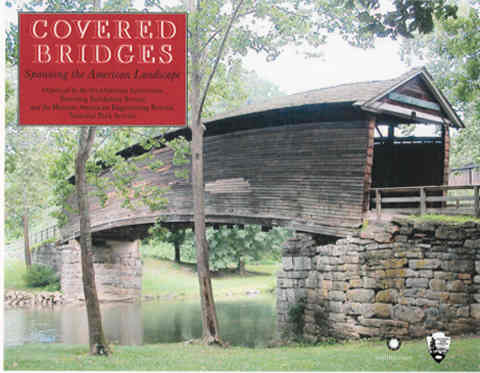
New Smithsonian Exhibition on Covered Bridges at the Montshire
August 5 - October 15, 2006

The Montshire Museum of Science in Norwich, Vermont is hosting a new exhibit on covered bridges this fall from August 5 to October 15. The exhibit includes dozens of beautiful photos of bridges, models, and exhibits about bridge design, function, and history.
Few structures in America combine architectural ingenuity, economic necessity and romantic idealism better than the covered bridge. A new Smithsonian exhibition, “Covered Bridges: Spanning the American Landscape,” will celebrate these iconic structures and the individuals behind their development through photographs, architectural schematics and models.
Though they first appeared in Europe during the Middle Ages, covered bridges flourished in the United States in the 19th century, where they helped encourage the country’s economic development by way of a growing network of roads. The first covered bridge in the country appeared over the Schuylkill River in Philadelphia in 1805, and by the 1870s more than 10,000 covered the American landscape as part of the country’s westward expansion.
From the beginning, individual inventiveness played an important role in the proliferation of covered bridges. As the industry grew, individual builders experimented and adapted each other’s designs in hopes of finding a means to build stronger bridges with the least amount of materials. In addition to being visually appealing, the resulting structures were engineering masterpieces—both important factors in their survival today.
Covered bridges grew in popularity among the general public in the early 20th century and became attractive subjects for artists and advertisers. They appeared in advertisements for everything from tires to thermal underwear, feeding the nation’s desire for nostalgia. In some cases, advertisers took their messages to the bridges themselves, creating enormous billboards on both the interiors and exteriors.
Despite their appeal, between 1870 and 1970, 90 percent of the country’s covered bridges were destroyed by arsonists, natural causes and progress in transportation. Today only about 750 remain, concentrated mostly in Pennsylvania, Ohio, Vermont, Indiana, New Hampshire and Oregon.
Those interested in this program can contact Kevin Coburn, Manager, Public Relations, Montshire Museum of Science, Norwich, VT. 802-649-2200 ext. 222, www.montshire.org

